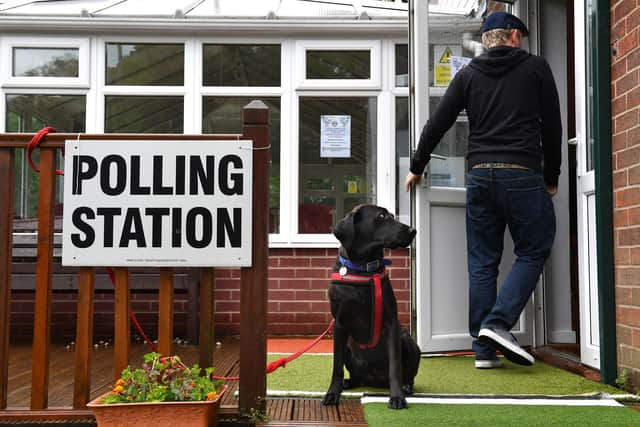Scottish independence: Plan to use general election as 'de facto referendum' could devastate the legitimacy of SNP and nationalism – Stewart McDonald
Celebrating my ninth anniversary with my partner last month, I can happily say that those days are long behind me. But I have, in my humble opinion, been receiving some far better messages recently. Since publishing my pamphlet, A Scotland That Can Vote Yes, outlining my opposition to a de facto referendum earlier this week, I have found myself receiving messages from friends, colleagues, and members of the public.
Many wrote to offer their support for my proposal, some thanked me for offering them food for thought in their deliberations, and more than one wrote to outline in great detail the many and varied reasons why they think I am barking up the wrong tree. This last type of messages is perhaps my favourite. As I have written in previous columns, there is no better sign of a healthy and vibrant democracy than the presence of vigorous and respectful policy disagreement between friends and strangers alike. And while I would say “keep it coming!”, I somewhat suspect that my detractors need little encouragement.
Advertisement
Hide AdAdvertisement
Hide AdBut those voices in favour of a de facto referendum must remember that they represent a minority position within the Scottish public – an uncomfortable reality, but reality, nonetheless. At most, 32 per cent of the electorate support a de facto referendum as a mechanism to secure Scotland’s independence, while support for a legitimate referendum enjoys the backing of two-thirds of Scotland’s people. As we approach our special conference, we in the SNP must not forget which way the political wind is blowing. The balance of public favour stands with us. We must handle it with care.
I have written before about the dangers of political activists falling into “Le Carré’s trap”, of fighting each other and believing that they fight the world. There can be no bigger, more obvious and more avoidable problem than this one, yet it is one to which political parties fall victim with depressing regularity.
We saw it with Theresa May, whose myopic view of British politics struggled to see beyond the internal divisions within the Tory party. It destroyed her political career and all of us still bear daily witness to the damage it did to her party and the country. So too with Corbyism, and a Labour membership convinced that their leader was going to sweep to glorious victory and leave his detractors floundering in his wake. Half a decade on and that legacy still haunts the Labour party.
My party cannot make the same mistake at our Special Democracy Conference. If we are serious about deciding Scotland’s future, we must consider the wider political outlook, and the political desires of the Scottish electorate, to properly inform our own. What I wanted from that pamphlet, most of all, was to start a vigorous, self-aware conversation within my party about the political winds that blow before us and the routes available to securing Scotland’s independence.
While it outlined my opposition to a de facto referendum and set out my preferred path forward – to strengthen the mandate we have secured by establishing a new national independence campaign body and drive support for independence to a sustained, clear majority – I’m conscious that party members might think differently.


But the path to independence involves thinking like a state and acting like one; we must recognise the political dynamics that constrain our movement as they constrain every single actor in the political system, from the Federation of Small Businesses to the United Nations Security Council.
There is no political group, party or state in the world than can succeed without an honest appraisal of where power lies and how it impacts them. These wider trends and possible paths, set by national and global factors beyond our control, will influence our course, and we must be uncompromisingly smart about how we navigate through them.
For the independence movement, the ghost at our feast will always be the structural imbalance of power between Edinburgh and London and the fact, recently confirmed by the UK Supreme Court, that Scotland can only leave the Union with Westminster’s consent. This fact cannot be wished away, even if His Majesty’s Government currently blocks a lawful, democratic path for Scottish voters to secure independence.
Advertisement
Hide AdAdvertisement
Hide AdWe must also be realistic about what a de facto referendum would achieve. To invoke it, one must assume that, if successful in achieving whatever the bar for success is to be, independence negotiations with HMG will follow. There are no grounds to believe this will happen. Who could honestly argue that a government that has developed a taste for challenging a whole string of devolved legislation in the courts and breaching constitutional norms will treat a parliamentary election result as a de facto referendum, especially one that it has lost?
One does not need the gift of prophecy to see how this could play out in a manner which could devastate the legitimacy of our party and our movement, and diminish our standing in the eyes of many friends at home and abroad. And so, as we approach the special conference, I urge my friends and colleagues to remember the world outside the conference hall. Remember that our movement seeks to shift the tectonic plates upon which the United Kingdom is built. Remember the awesome and historical significance of our task.
There is no royal road to Scotland’s independence. No conference motion, however painstakingly drafted, can speed that process along. The real path to Scotland’s independence is found in the streets and in books and in five million conversations. Scotland will only become independent when a majority of our fellow citizens want it. It’s as simple – and as demanding – as that.
Stewart McDonald is the SNP MP for Glasgow South
Comments
Want to join the conversation? Please or to comment on this article.